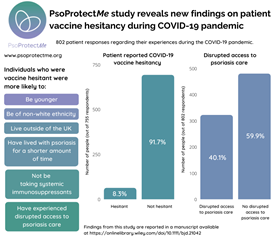08 March 2022
PsoProtectMe study reveals new findings on patient vaccine hesitancy during COVID-19 pandemic
Hesitancy towards the COVID-19 vaccine in people with psoriasis is greater in those with disrupted access to psoriasis care.
New findings published in the British Journal of Dermatology indicate that while only a minority of people with psoriasis were hesitant towards the COVID-19 vaccine, people with disrupted access to psoriasis care during the pandemic were more likely to be hesitant.
These findings are based on data collected through the global PsoProtectMe survey for people with psoriasis.
Here is a short summary of the research findings:
The COVID-19 vaccine is known to protect against severe COVID-19 outcomes, such as hospitalisation or death, but many individuals remain vaccine hesitant (refuse or delay acceptance of the vaccine). People with psoriasis who are taking drugs that affect the immune system are prioritised for COVID-19 vaccination but little is known about vaccine hesitancy in this population. We wanted to investigate COVID-19 vaccine hesitancy amongst people with psoriasis and identify the factors which may contribute to this.
We invited people with psoriasis to provide information about whether they have had or planned to have the COVID-19 vaccine. We collected this information through a series of structured questions in a web-based survey for people with psoriasis called PsoProtectMe. PsoProtectMe also included questions about the impact of the pandemic on access to psoriasis care.
Eight-hundred and two people with psoriasis from 89 countries answered questions about access to care in PsoProtectMe (up to 08/2021). Three hundred and twenty-two (40%) people reported disrupted access to psoriasis care during the pandemic. These individuals were more likely to be younger, of non-white ethnicity, have lived with psoriasis for a shorter amount of time and had more severe psoriasis.
A minority were hesitant towards the COVID-19 vaccine (8%), which is promising for current and future COVID-19 booster vaccine uptake. Those who were vaccine hesitant were more likely to be younger, of non-white ethnicity, live outside of the UK and have a shorter duration of psoriasis. They were less likely to be taking tablet or injection medications for their psoriasis. The commonest concerns about the vaccine were about possible side effects, the vaccine being new and worry about their psoriasis becoming worse after receiving the vaccine.
This study found that people reporting disrupted access to psoriasis care were more likely to be hesitant towards the COVID-19 vaccine. Improving access to care and addressing the concerns of people with psoriasis who feel disenfranchised by their healthcare teams may help to address vaccine hesitancy and mitigate risks from the ongoing pandemic.
End of Summary
You can read the full paper here.
If you have psoriasis yourself, you can report your experiences of life during the COVID-19 pandemic (whether or not you have had symptoms of COVID-19) here.
If you are a healthcare professional treating patients with psoriasis, please continue to report cases of suspected or confirmed COVID-19 infection in your patients here.
